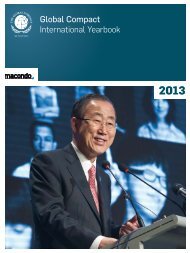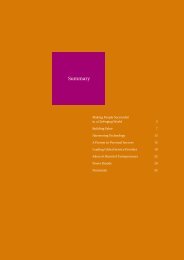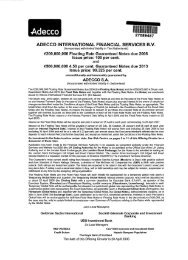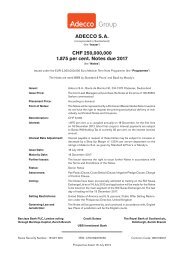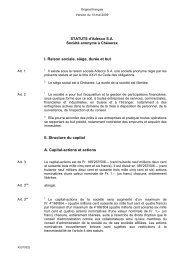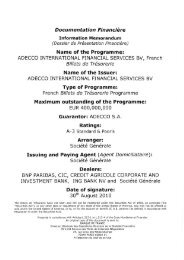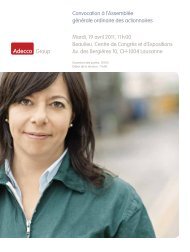Making people successful in a changing world - Annual Report 2012
Making people successful in a changing world - Annual Report 2012
Making people successful in a changing world - Annual Report 2012
Create successful ePaper yourself
Turn your PDF publications into a flip-book with our unique Google optimized e-Paper software.
F<strong>in</strong>ancial reviewIn millions, except share and per share amountsConsolidated sell<strong>in</strong>g, general and adm<strong>in</strong>istrativeexpenses <strong>in</strong>crease as Adecco ma<strong>in</strong>ta<strong>in</strong>s branchnetworkSell<strong>in</strong>g, general and adm<strong>in</strong>istrative expenses for the group, whichconsists pr<strong>in</strong>cipally of personnel costs, office adm<strong>in</strong>istration, rentand market<strong>in</strong>g <strong>in</strong>creased 5% or CHF 187 <strong>in</strong> 2001 to CHF 3,941 fromCHF 3,754 <strong>in</strong> 2000. As a percentage of sales, sell<strong>in</strong>g, general andadm<strong>in</strong>istrative expenses <strong>in</strong>creased to 14.5% <strong>in</strong> 2001 compared with14.1% <strong>in</strong> 2000. In 2001, personnel costs <strong>in</strong>creased by 8%, officeadm<strong>in</strong>istration by 7%, premises expenses by 18%, and market<strong>in</strong>gwas down by 1%. To ensure that Adecco responds to marketconditions, management has cont<strong>in</strong>ued to implement sensible costcontrol measures. However, management rema<strong>in</strong>s committed toma<strong>in</strong>ta<strong>in</strong><strong>in</strong>g the branch network. This year, Adecco added 12% morebranches. Adecco now has nearly 6,000 branches <strong>in</strong> total, spann<strong>in</strong>g58 countries.Amortisation of goodwill for the group rema<strong>in</strong>sconstantGoodwill amortisation decreased <strong>in</strong> 2001 by CHF 3 to CHF 1,106,compared to CHF 1,109 <strong>in</strong> 2000. The decrease was primarily due tothe net impact of 3 additional months of goodwill amortisationresult<strong>in</strong>g from the acquisition of Olsten Corporation, for which theamortisation period began <strong>in</strong> March 2000 and the fact that thegoodwill result<strong>in</strong>g from the Adia-Ecco merger was fully amortised <strong>in</strong>June 2001. As of December 30, 2001, the rema<strong>in</strong><strong>in</strong>g amount ofunamortised goodwill was CHF 2,292.Effective on the first day of fiscal year 2002 Adecco will no longeramortise any goodwill to earn<strong>in</strong>gs, but <strong>in</strong>stead will be required toreview its recoverability annually for impairment. Other identifiable<strong>in</strong>tangibles will cont<strong>in</strong>ue to be amortised to earn<strong>in</strong>gs over theirestimated useful lives. As a result Adecco will no longer amortisegoodwill, thereby reduc<strong>in</strong>g estimated annual goodwill amortisationbefore any tax effect by approximately CHF 850 for 2002.Amortisation of goodwill before any tax effect was CHF 1,106.Intangible assets acquired prior to July 1, 2001 that have beenreported together with goodwill will be reported separately <strong>in</strong> 2002,however, the amount presented <strong>in</strong> the balance sheet and relatedamortisation is not viewed as material.Treasury managementAdecco conducts bus<strong>in</strong>ess and funds its subsidiaries <strong>in</strong> variouscountries and currencies, and therefore, is exposed to effects ofchange <strong>in</strong> foreign currency exchange rates ma<strong>in</strong>ly the US Dollar, theEuro, the British Pound and the Japanese Yen. Adecco also issuesbonds and short and long-term notes <strong>in</strong> various currencies. Adecco,<strong>in</strong> accordance with its written risk management policy, cont<strong>in</strong>ues tomonitor its currency exposures and where appropriate enters <strong>in</strong>tohedg<strong>in</strong>g transactions to m<strong>in</strong>imise its overall exposure to volatility <strong>in</strong>its earn<strong>in</strong>gs.The <strong>in</strong>terest expense l<strong>in</strong>e <strong>in</strong>cludes ma<strong>in</strong>ly <strong>in</strong>terest on externaldebt, amortisation of capitalised f<strong>in</strong>anc<strong>in</strong>g costs and hedg<strong>in</strong>g costs.Interest expense decreased by CHF 21 <strong>in</strong> 2001 to CHF 242 comparedto CHF 263 <strong>in</strong> 2000, primarily due to the reduction <strong>in</strong> net debt ofCHF 739 dur<strong>in</strong>g the year. Adecco recorded an expense of CHF 20 andCHF 26 <strong>in</strong> 2001 and 2000 respectively as net of foreign exchangega<strong>in</strong>s and losses and net hedg<strong>in</strong>g expenses <strong>in</strong> <strong>in</strong>terest expenses. The<strong>in</strong>crease of other expense of CHF 27 million related ma<strong>in</strong>ly towrite-downs on <strong>in</strong>vestments.Effective January 1, 2001, Adecco adopted the F<strong>in</strong>ancialStandards Board (FASB) Statement of F<strong>in</strong>ancial Account<strong>in</strong>g (SFAS)No. 133, “Account<strong>in</strong>g for Derivative Instruments and Hedg<strong>in</strong>gActivities” and SFAS No. 138,” Account<strong>in</strong>g for certa<strong>in</strong> DerivativesInstruments and Certa<strong>in</strong> Hedg<strong>in</strong>g Activities an amendment of FASBStatement No. 133”, which replaces exist<strong>in</strong>g pronouncements andpractices for derivatives and hedg<strong>in</strong>g activities with a s<strong>in</strong>gle,<strong>in</strong>tegrated account<strong>in</strong>g framework. Upon adoption of thesestatements, Adecco recorded a net transition adjustment after tax ofCHF 8 <strong>in</strong> net earn<strong>in</strong>gs.Effective tax rateThe provision for <strong>in</strong>come taxes decreased by CHF 11 to CHF 254 <strong>in</strong>2001 from CHF 265 <strong>in</strong> 2000. Adecco’s <strong>in</strong>come tax provision differsfrom the expected tax benefit of CHF 119 for 2001 and expected taxbenefit of CHF 64 <strong>in</strong> 2000, calculated by totall<strong>in</strong>g the products ofpre-tax <strong>in</strong>come (loss) <strong>in</strong> each country multiplied by that country’sstatutory <strong>in</strong>come tax rate, pr<strong>in</strong>cipally as a result of non-deductiblegoodwill amortisation <strong>in</strong> certa<strong>in</strong> jurisdictions of CHF 231 <strong>in</strong> 2001and CHF 297 <strong>in</strong> 2000.Liquidity and Capital ResourcesAs of December 30, 2001, Adecco had cash and cash equivalents ofCHF 552 and short-term and long-term debt totall<strong>in</strong>g CHF 3,042,compared to CHF 487 and CHF 3,736 as of December 31, 2000.Net cash flow from operat<strong>in</strong>g activities <strong>in</strong> 2001 was CHF 1,390.Net cash expended <strong>in</strong> <strong>in</strong>vest<strong>in</strong>g activities for 2001 was CHF 528,related primarily to the addition to fixed assets of CHF 297 and thepurchase of the m<strong>in</strong>ority <strong>in</strong>terest of Olsten Norway of CHF 184. Netcash used <strong>in</strong> f<strong>in</strong>anc<strong>in</strong>g activities for 2001 was CHF 780, primarilyrelated to changes <strong>in</strong> debt and the payment of dividends. Net debtdecreased primarily due to the free cash flow generated fromoperations.In the ord<strong>in</strong>ary course of bus<strong>in</strong>ess, Adecco’s pr<strong>in</strong>cipal fund<strong>in</strong>grequirements are associated with f<strong>in</strong>anc<strong>in</strong>g work<strong>in</strong>g capital andcapital expenditures. Work<strong>in</strong>g capital requirements are primarily <strong>in</strong>the form of accounts receivable and are offset by accounts payableand accrued expenses, all of which <strong>in</strong>crease as revenues <strong>in</strong>crease.Net work<strong>in</strong>g capital <strong>in</strong> 2001, exclud<strong>in</strong>g cash and short-termf<strong>in</strong>anc<strong>in</strong>g, decreased by approximately CHF 702, primarily relat<strong>in</strong>g toa greater decrease <strong>in</strong> receivables than payables. The level of work<strong>in</strong>gcapital f<strong>in</strong>anc<strong>in</strong>g is primarily dependent upon accounts receivableturnover, which varies by location, and capital expenditures whichprimarily relates to new branch open<strong>in</strong>gs and expenditures for<strong>in</strong>formation systems. Cash disbursement activity is predom<strong>in</strong>antlyassociated with scheduled payroll payments for its temporarypersonnel, and Adecco has limited flexibility to adjust itsdisbursement schedule. Conversely, collection or related accountsreceivable from customers may be considerably delayed, result<strong>in</strong>g <strong>in</strong>steeply ris<strong>in</strong>g work<strong>in</strong>g capital requirements dur<strong>in</strong>g periods ofgrowth. As of December 30, 2001, accounts receivable had beenoutstand<strong>in</strong>g for an average of 64 compared to 63 days as ofDecember 31, 2000. To f<strong>in</strong>ance work<strong>in</strong>g capital requirements Adeccouses multicurrency credit facilities, credit l<strong>in</strong>e facilities and bankoverdrafts. As of December 30, 2001, the consolidated short-term5



